INTERNACIONAL
Pope appears in St. Peter’s Square for first time in weeks
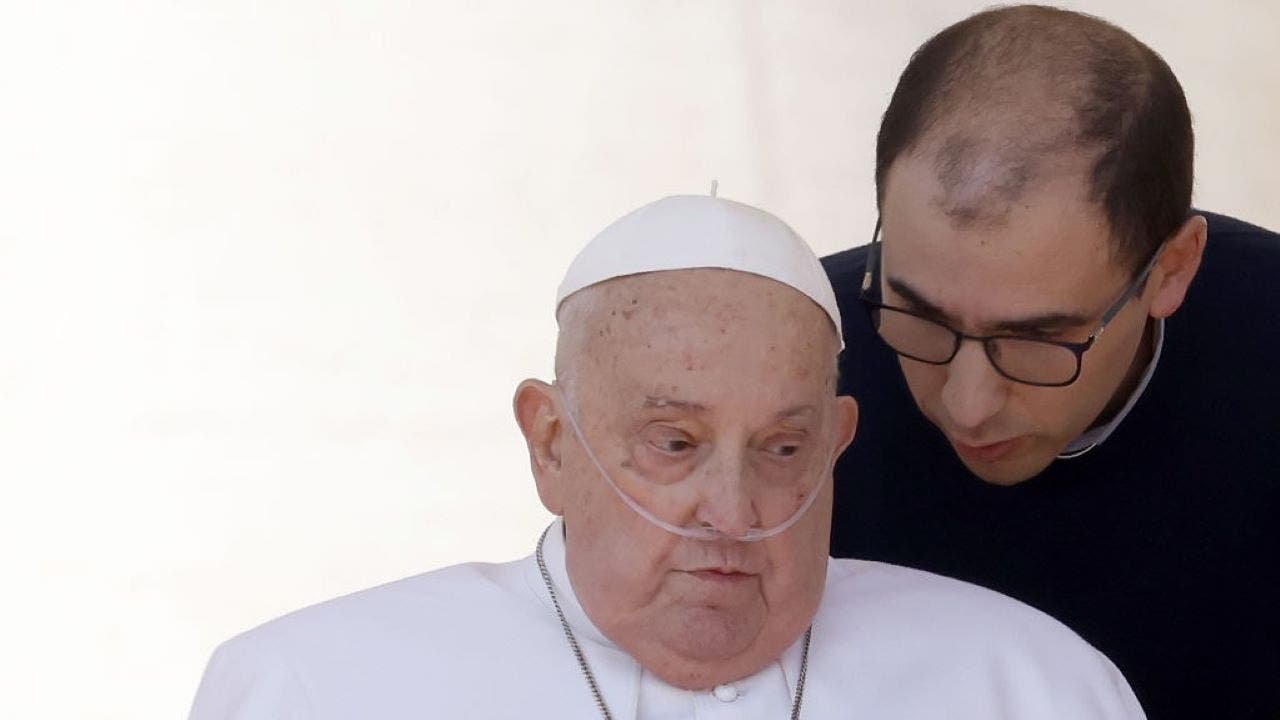
Pope Francis appeared in public for the first time in weeks on Sunday, greeting crowds from a wheelchair in St. Peter’s Square at the Vatican.
It was the first time Francis appeared in public since he briefly addressed crowds when being discharged from the hospital on March 23. The pope suffered a bout of double pneumonia that left him hospitalized for five weeks.
Francis made the unannounced visit near the end of Mass and delivered a brief greeting, all while receiving oxygen via his nose.
«Good Sunday to everyone,» Francis said. «Thank you so much.»
POPE FRANCIS MAKES FIRST PUBLIC APPEARANCE IN FIVE WEEKS
Pope Francis listens to his secretary as he appears to the faithful at the end of a Mass celebrated by Monsignor Rino Fisichella (not pictured) on the occasion of the Jubilee of the Sick in St. Peter’s Square at the Vatican on April 6, 2025. (Riccardo De Luca/Anadolu via Getty Images)
MEDICAL STAFF PROVIDES UPDATE ON POPE FRANCIS’ CONDITION
The Vatican also released a written message from Francis marking Sunday’s Mass, which was specially focused on healthcare workers.
«I ask the Lord that this touch of his love might reach all those who suffer and encourage those who are taking care of them,» said the text.
Doctors overseeing Francis’ care during his stay at Gemelli Hospital in Rome say that they briefly considered ending the pope’s treatment due to his condition.
Medical director Dr. Sergio Alfieri recounted the scenes on Feb. 28 when the 88-year-old suffered a coughing fit and inhaled vomit, prompting staff to have to clear his airways and later put on a non-invasive mechanical ventilation mask to help him breathe.
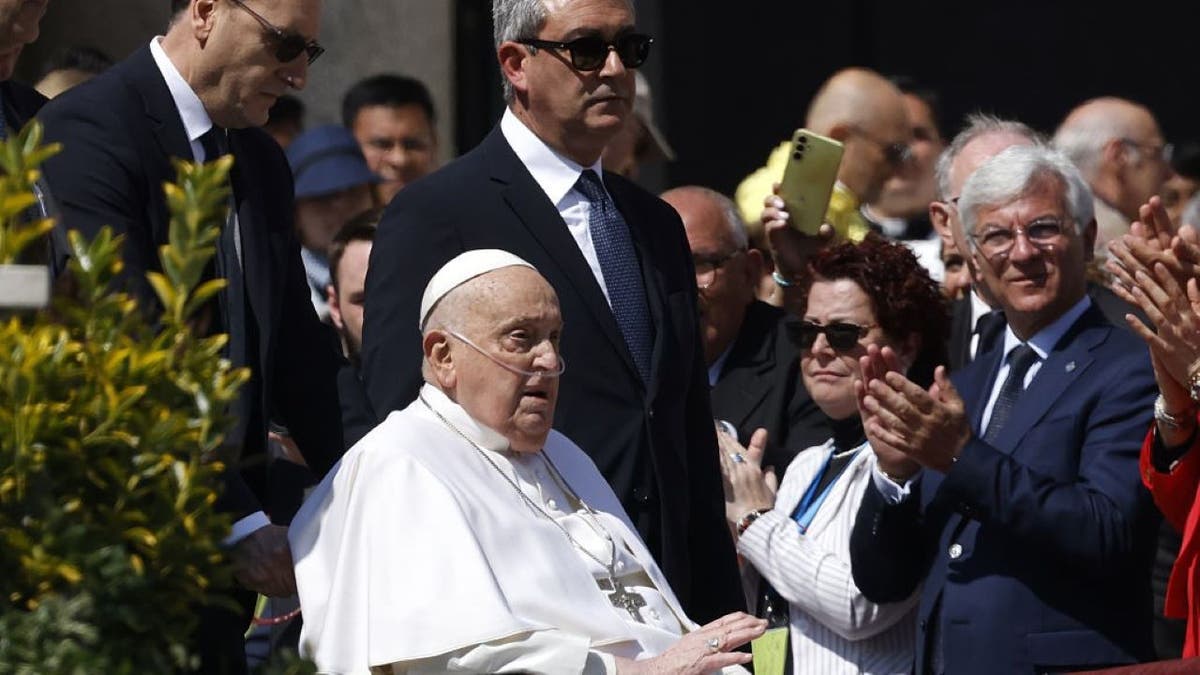
Pope Francis appears in St. Peter’s Square for the first time in weeks. (Riccardo De Luca/Anadolu via Getty Image)
«For the first time I saw tears in the eyes of some of the people around him. People who, I understood during this period of hospitalization, sincerely love him, like a father. We were all aware that the situation had worsened further and there was a risk that he would not make it,» Alfieri told the Corriere della Sera newspaper.
«We had to choose whether to stop and let him go or force it and try with all the drugs and therapies possible, running the very high risk of damaging other organs. And in the end we took this path,» he reportedly added.
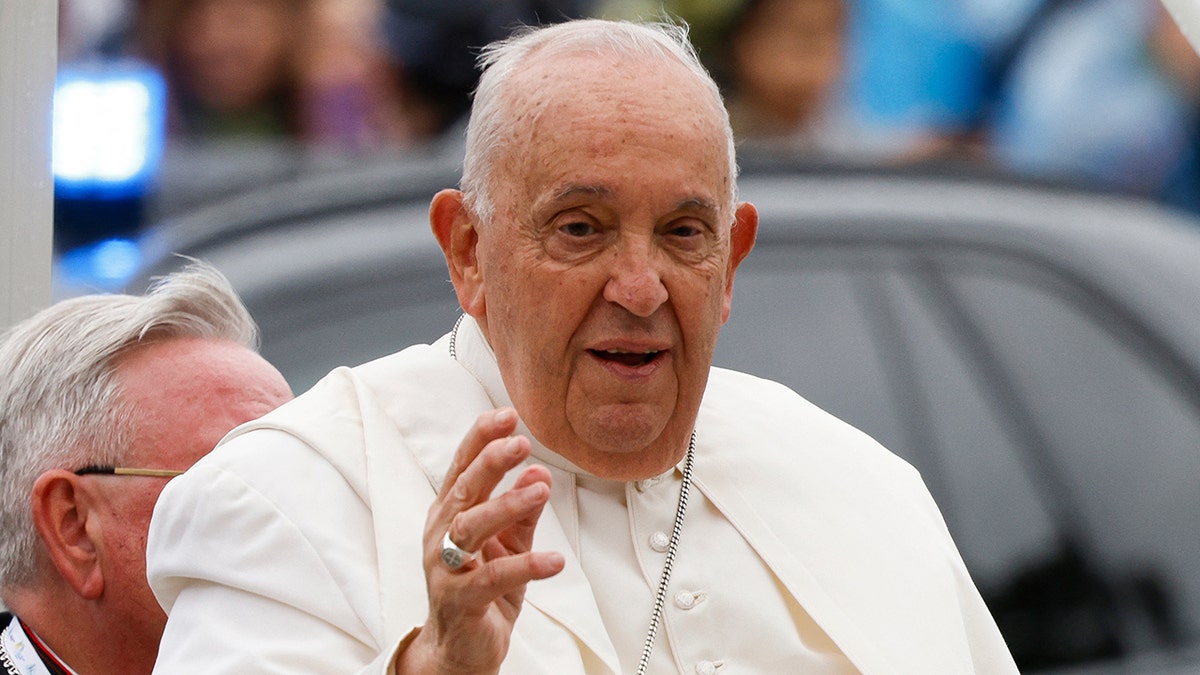
Pope Francis waves to believers as he leaves the Cercle Cite after a meeting with Luxembourg’s prime minister during a four-day apostolic journey in Luxembourg and Belgium, in Luxembourg City, on Sept. 26, 2024. (Simon Wohlfahrt/AFP/Getty)
Alfieri said to the newspaper that Francis «delegated every type of healthcare decision to Massimiliano Strappetti, his personal healthcare assistant who knows the Pope’s wishes perfectly.»
CLICK HERE TO GET THE FOX NEWS APP
«Try everything, we won’t give up,» Alfieri recalled Strappetti telling staff at the hospital. «That’s what we all thought, too. And no one gave up».
INTERNACIONAL
De “Hey Jude” a “Hotel California”: 40 letras de canciones que hicieron historia
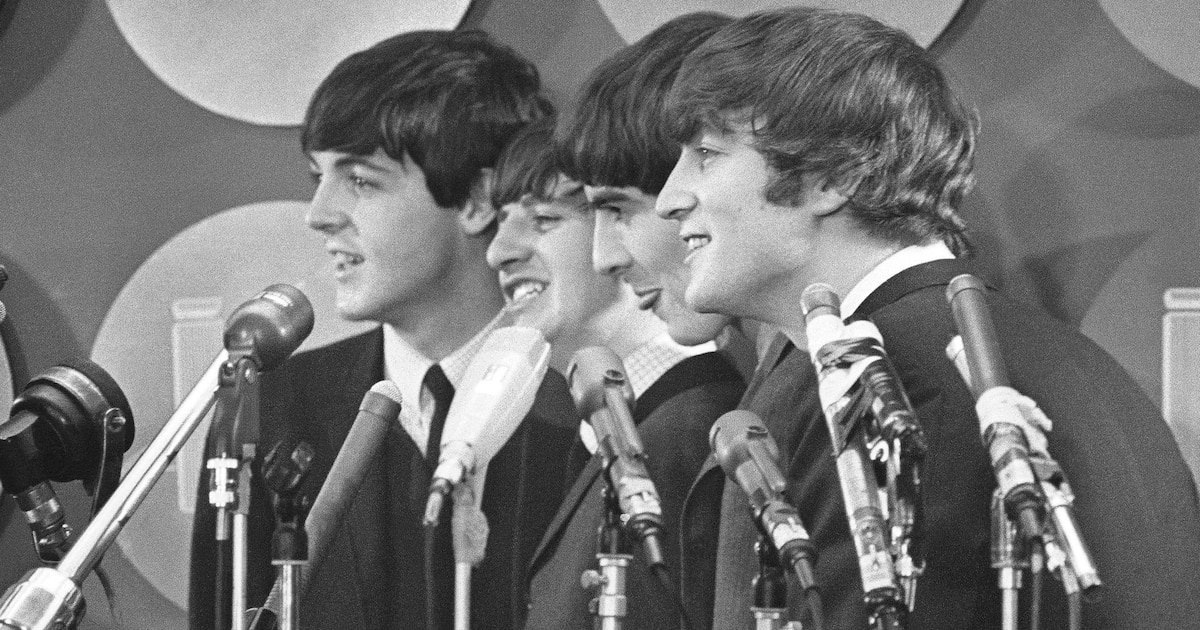
Hay canciones que pasan a la historia, ya sea por su melodía, por las voces que las interpretan o sus letras. The Independent realizó un ranking de las 40 mejores letras de canciones en inglés de todos los tiempos. Bandas como Nirvana, The Beatles o Abba forman parte del listado. Según el ranking, las canciones se destacaron no solo por su música o interpretación, sino también por la fuerza de sus palabras, capaces de dejar una huella en distintas generaciones.
La lista está encabezada por ‘All Apologies’ de Nirvana. El tema está incluido en el álbum In Utero de 1993. Cobain escribió esta canción dirigiéndose tanto a Courtney Love como a su hija, Frances Bean. Para muchos, este track logra transmitir con especial nitidez el malestar interno y la rabia del músico, a la vez que se entrelaza con una profunda declaración de amor hacia su familia.
Según The Independent, el mensaje contenido en esta canción supera la tragedia personal de Cobain y subraya la permanencia del afecto más allá de la ausencia física. Apenas seis meses después del lanzamiento, el artista se quitó la vida y dejó atrás de sí un tema que muchos consideran imprescindible para comprender el significado de su legado artístico.
El listado continúa con Nine Inch Nails, ‘Hurt’. El tema, escrito e interpretado por Trent Reznor, hace un retrato directo de la autodestrucción y el sufrimiento, elementos presentes desde la primera grabación. Si bien Reznor nunca precisó si el trasfondo hace referencia al consumo de heroína, el texto y la atmósfera de la canción transmiten una carga emotiva que oscila entre el dolor y una poesía sombría.
Joy Division con su hit ‘Love Will Tear Us Apart’ da continuidad al ranking. “¿Por qué el dormitorio está tan frío volteado de tu lado?, ¿Mi sincronización es tan imperfecta, nuestro respeto se ha agotado?“, cita la letra. El sencillo, escrito por Ian Curtis, refleja matices de su propia experiencia personal, marcada por la crisis matrimonial y una inminente tragedia.
La canción sobresale por una combinación de melodía vibrante y una lírica de gran vulnerabilidad. La composición no transmite un mensaje sombrío en sí mismo, sino que transforma su tristeza en una pieza conmovedora, donde la humanidad del autor adquiere toda su dimensión.
Arcade Fire, ‘Sprawl II Mountains Beyond Mountains’ continúa la lista. Junto a la voz de Régine Chassagne, la canción aporta una atmósfera única. La melodía logra materializar emociones latentes y anhelos de escapar de la uniformidad.
El ranking, presentado por The Independent, sigue con Beyoncé, ‘Formation’; Laura Marling, ‘Ghosts’; LCD Soundsystem, ‘Losing My Edge’; Leonard Cohen, ‘So Long, Marianne’; The Libertines, ‘Can’t Stand Me Now’; Kate Bush, ‘Cloudbusting’; Nick Cave, ‘Into My Arms’; The Sisters of Mercy, ‘This Corrosion’ y Sultans of Ping FC con ‘Where’s Me Jumper?’
Seguidamente, el medio español posicionó entre los mejores temas a ‘There Is a Light That Never Goes Out’, de The Smiths; ‘I’m On Fire’ de Bruce Springsteen; ‘Father Lucifer’ de Tori Amos; ‘Black Steel in the Hour of Chaos’ de Public Enemy y ‘Pools (Drank)’ de Kendrick Lamar.
Mientras la comunidad afroamericana afrontaba las consecuencias de políticas conservadoras, Prince decidió abordar en su tema principal cuestiones como la violencia asociada a las pandillas, la pandemia del sida, tensiones políticas y catástrofes naturales. Con este enfoque, el cantante dejó atrás su aislamiento creativo y presentó ‘Sign O ‘The Times’, una canción donde la reflexión social y el comentario sobre realidades urgentes pasaron a primer plano.
En el listado no podían faltar los Rolling Stones. Si bien tienen grandes letras, en ‘Gimme Shelter’ recrean la atmósfera de inestabilidad y amenaza constante de la época. La composición captura el miedo y la incertidumbre de una sociedad al borde de la ruptura. Asimismo consolida el legado de Mick Jagger, Keith Richards y sus compañeros como cronistas musicales de un periodo turbulento.
Si de turbulencias se trata, David Bowie es uno de los artistas que, durante su vida, atravesó momentos turbulentos. Estos periodos fueron de gran inspiración para el músico a la hora de componer. ‘Station to Station’ es una de las canciones grabadas en los días más oscuros de Bowie. El músico lidiaba con su adicción a las drogas en Los Ángeles mientras buscaba refugio en las letras.
El ranking continúa con ‘Supersonic’, de Oasis; ‘Born Slippy’ de Underworld; ‘Landslide’ de Fleetwood Mac; ‘Graceland’ de Paul Simon; ‘Take a Walk on the Wild Side’ de Lou Reed; ‘Every Time the Sun Comes Up’, de Sharon Van Etten; ‘Gloria’ de Patti Smith; y ‘Hotel California’ de Eagles.

Thin Lizzy sigue el listado con ‘The Boys are Back in Town’. Le sigue Nina Simone con ‘Four Women’; St. Vincent ‘Digital Witnesses’; Frank Ocean con ‘Pink + White’. El ranking continúa con ‘Dinner at Eight’ de Rufus Wainwright; ‘It’s Alright Ma’’ de Bob Dylan; ‘The Winner Takes it All’ de Abba y ‘I Wanna Be Adored’ de The Stone Roses.
En los tres últimos puestos se encuentran ‘The World is Yours’ de Nas; ‘When I’m Sixty Four’ de The Beatles y Beck con ‘Loser’. Este último es uno de los éxitos más recordados de Beck. Surgió a partir de una autocrítica espontánea después de escuchar una versión preliminar del tema. El propio músico reconoció sentirse «el peor rapero del mundo» y se definió como “un perdedor”.
Esta percepción no solo alimentó el concepto de la canción, sino que inspiró el famoso estribillo que acabó identificando al tema. A pesar de la aparente falta de coherencia en la letra, la composición logra crear una atmósfera singular gracias a su escritura en flujo de conciencia, un recurso que genera magnetismo incluso en lo absurdo.
INTERNACIONAL
House Republicans warn anti-ICE rhetoric from Democrats is driving violent attacks on agents

NEWYou can now listen to Fox News articles!
President Donald Trump’s crackdown on illegal immigration and deportation rollout has ignited anti-Immigration and Customs Enforcement (ICE) protests across the United States.
House Republicans told Fox News Digital there is a parallel between Democrats’ rhetoric against federal immigration officers amid this crackdown and the surge in violence against ICE and Border Protection (CBP) officers.
«The increasingly violent attacks against law enforcement are being egged on by irresponsible Democratic politicians,» Rep. Tom McClintock, R-Calif., said in an exclusive interview.
Department of Homeland Security (DHS) Secretary Kristi Noem on Monday blamed Democrats’ «sanctuary city policies» for the shooting of an off-duty CBP officer in New York City.
NOEM WARNS OF ‘UNPRECEDENTED’ THREAT LEVEL FOR ICE AGENTS, BLAMES ‘LIES’ FROM DEMOCRATS
A split image of demonstrators in New York City protesting the Trump administration’s use of the Alien Enemies Act to more quickly deport certain migrants from the U.S. to El Salvador, alongside a photo of U.S. President Donald Trump at the White House in 2025. (Getty Images)
A second illegal immigrant has been apprehended in connection to the shooting of the CBP officer. He was reportedly struck in the face and forearm in Manhattan’s Riverside Park on Saturday night. Miguel Francisco Mora Nunez, a Dominican national who was caught by Border Patrol in April 2023, was taken into custody following the shooting.
GUNMAN AMBUSHES BORDER PATROL AGENTS DAYS AFTER HOUSE DEMS REJECT RESOLUTION CONDEMNING ANTI-ICE VIOLENCE
«Without enforcing our immigration laws, we have no immigration laws,» McClintock continued. «Without immigration laws, we have no border, and without a border we have no country. And that’s what Americans suffered for four long years with the open borders policies of the Biden administration.»
Democrat Sens. Alex Padilla and Cory Booker, two of the leading Capitol Hill critics of Trump’s illegal immigration crackdown, have introduced legislation that would require immigration enforcement officers to clearly identify themselves without masks.
Rep. Andrew Clyde, R-Ga, told Fox News Digital that he has «absolutely» seen an increase in violence, explaining that when a member of Congress uses «radical rhetoric,» people take it to heart.
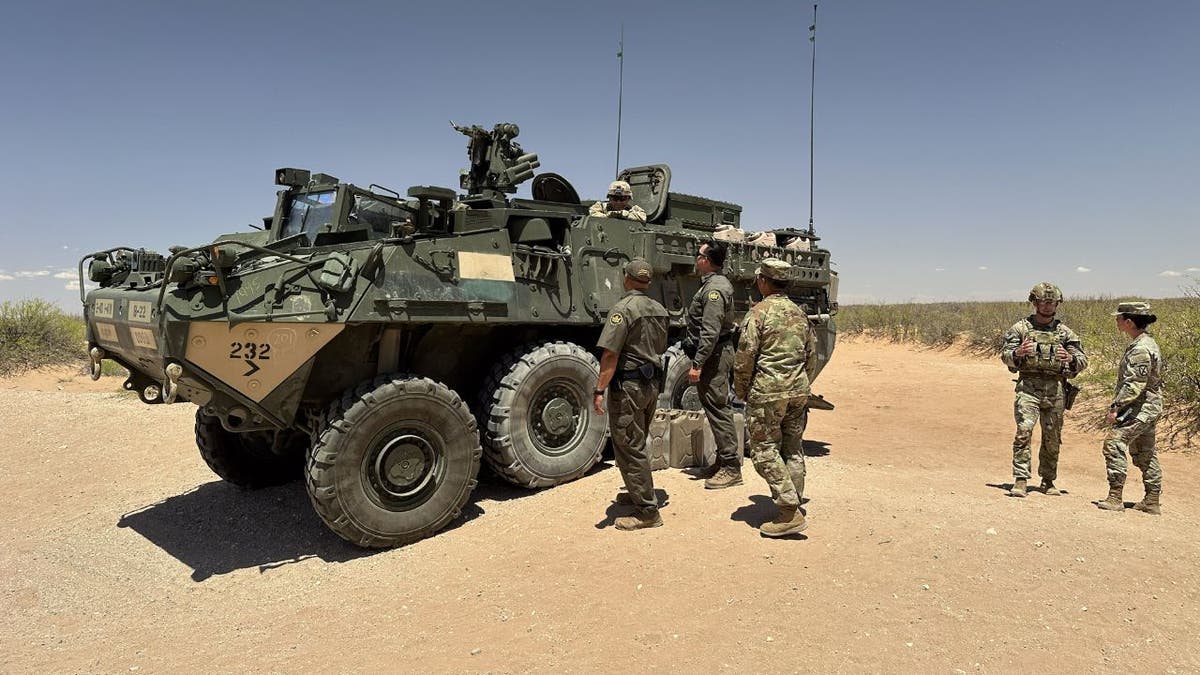
US soldiers seen at the US-Mexican border in New Mexico on May 8, 2025. (Can Hasasu/Anadolu via Getty Images)
«We should be applauding them. We should be thankful to them. They are literally removing criminal aliens from our midst and making us a safer nation. And yet these radical Democrats are inflaming the public. And as a result, you’re seeing more violence against them. And it’s unconscionable that they do that,» Clyde said.
Federal immigration law enforcement officers have been targeted since Trump signed his «big, beautiful bill» into law, which includes legislation for robust immigration reform. There were at least two ambushes in Texas, and protesters clashed with federal officers at the Portland, Oregon, ICE facility, over the Fourth of July weekend.
Rep. Michael Guest, R-Miss., told Fox News Digital that there has been «growing rhetoric by many on the Democratic side» from everyone except Sen. John Fetterman, D-Pa. Particularly in Los Angeles, Guest pointed to California Gov. Gavin Newsom’s and Mayor Karen Bass’ anti-ICE rhetoric as protests delved into riots in the West Coast city last month.

Immigration and Customs Enforcement (ICE) agents, along with other federal law enforcement agencies, attend a pre-enforcement meeting in Chicago on Jan. 26, 2025. (Christopher Dilts/Bloomberg via Getty Images)
Bass has signed a series of executive orders aimed at impeding ICE deportation raids in Los Angeles, criticizing the «unconstitutional, reckless raids» and establishing a Los Angeles Police Department (LAPD) working group that expands resources for families impacted by Trump’s deportation rollout.
«When we have Democrats constantly attacking our ICE agents for what they’re doing, demonizing them for enforcing the law, that is going to create more violence, and the situation is going to get worse and not better,» Guest added.
Rep. Mariannette Miller‑Meeks, R‑Iowa, added in an interview with Fox News Digital that it’s «unreal to me that people are attacking law enforcement agents trying to do their job.»
CLICK HERE TO GET THE FOX NEWS APP
She said the emphasis should be on supporting ICE and CBP agents.
«Keep the focus on deporting criminal illegals, people that are bad actors that should be out of the country, focusing on the influence of gangs and cartels in this country,» Miller-Meeks added, urging her fellow House Republicans to remind Americans that these deportations are necessary due to the surge of illegal immigration under the Biden administration.
Fox News Digital reached out to Biden’s office for comment but did not immediately hear back.
INTERNACIONAL
27 inmates from notorious Iranian prison still at large after Israeli strike: Tehran

NEWYou can now listen to Fox News articles!
Iranian media reported that 27 inmates from the notorious Evin Prison remain at large following an Israeli airstrike last month.
After Israel’s strike during the 12-day war, 75 inmates escaped from Evin prison, according to the Associated Press, which cited a news website affiliated with Iran’s judiciary. In the article, Iranian Judiciary Spokesperson Asghar Jahangir said that out of the 75 escapees, 48 were either recaptured or returned voluntarily, the Associated Press added. Jahangir also stated that the escapees had been serving time for minor offenses.
A view shows the aftermath of an Israeli strike on Evin Prison that took place on June 23, after the ceasefire between Israel and Iran, in Tehran, Iran, June 29, 2025. (Majid Asgaripour/WANA (West Asia News Agency) via REUTERS)
IRAN CLAIMS ITS PRESIDENT WAS INJURED IN ISRAELI AIRSTRIKE LAST MONTH
In June, Israel launched Operation Rising Lion, which was aimed at destroying Iran’s nuclear capabilities. While Iranian officials said 71 were killed in the strike, local media reported that there were 80 killed, including staff, soldiers, inmates and visiting family members, according to the Associated Press.
Sayeh Seydal, a jailed Iranian dissident who survived Israel’s strike on Evin Prison, told relatives that being in the facility was a «slow death,» according to the Associated Press, which obtained a recording of the conversation.
«The bombing by the U.S. and Israel didn’t kill us. Then the Islamic Republic brought us to a place that will practically kill us,» Seydal said.
On Tuesday, Amnesty International called for an investigation of Israel’s strike on the prison as a possible war crime, saying it constituted «a serious violation of international humanitarian law.»
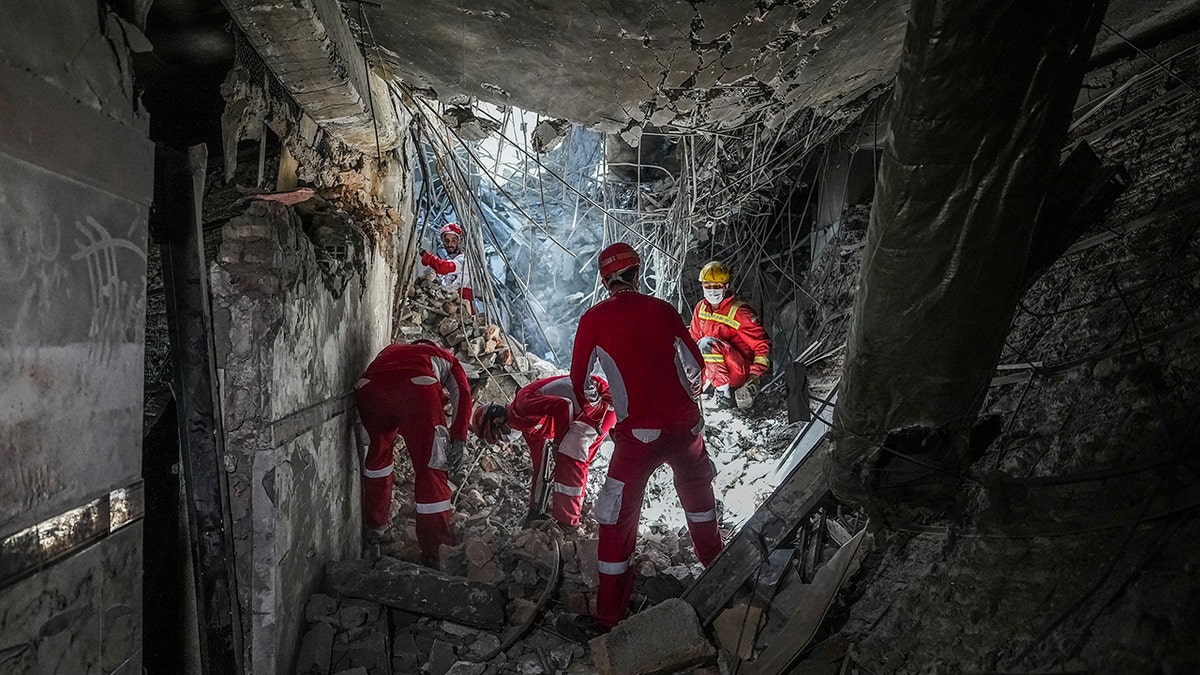
FILE – Rescuers search through the rubble of a damaged section of Evin Prison following an Israeli strike the day before, in Tehran, Iran, Tuesday, June 24, 2025. (AP Photo/Mostafa Roudaki/Mizan News Agency, File) (AP Photo/Mostafa Roudaki/Mizan News Agency, File)
IRAN ACKNOWLEDGES DEATH TOLL FROM ISRAEL’S STRIKE ON NOTORIOUS EVIN PRISON
Erika Guevara Rosas, who serves as Amnesty International’s Senior Director for research, advocacy, policy and campaigns, said «the evidence establishes reasonable grounds to believe that the Israeli military brazenly and deliberately attacked civilian buildings.»
Evin Prison is infamous for its harsh conditions and became a place for Iranian officials to throw protesters.

A person stands on the rubble as a view shows the aftermath of an Israeli strike on Evin Prison that took place on June 23, after the ceasefire between Israel and Iran, in Tehran, Iran, June 29, 2025. (Majid Asgaripour/WANA (West Asia News Agency) via Reuters)
CLICK HERE TO GET THE FOX NEWS APP
In 2022, the U.S. Treasury Department sanctioned Iranian officials and entities responsible for a crackdown on protesters, including Evin Prison warden Hedayat Farzadi, who was known for his brutal tactics. The department said that protesters thrown in Evin Prison under Farzadi’s watch were subjected to torture and physical abuse.

 POLITICA3 días ago
POLITICA3 días agoJuan Carlos Maqueda defendió la condena contra Cristina Kirchner: “Hay una sensación de que se hizo Justicia y que no hay impunidad”

 POLITICA2 días ago
POLITICA2 días agoExpulsada del Gobierno, Victoria Villarruel empieza a tomar distancia, pero no tiene proyecto político para este año

 POLITICA2 días ago
POLITICA2 días agoLa CGT evalúa adelantar a octubre el recambio de sus autoridades y define una movilización contra Milei























